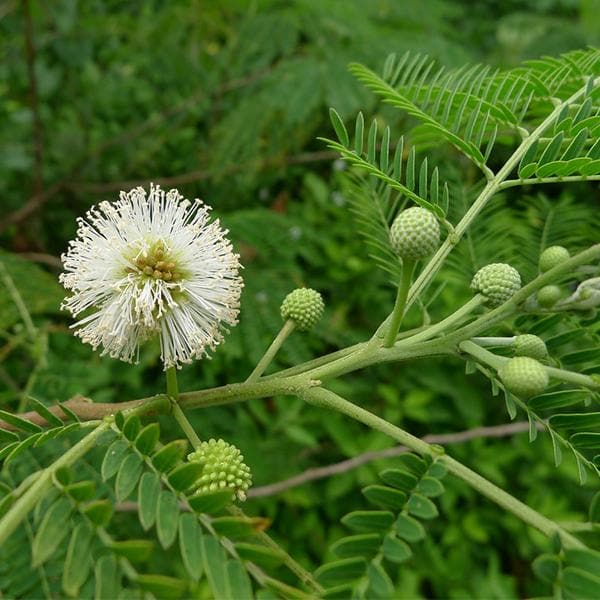
Subabul, Leucaena leucocephala - 0.5 kg Seeds
(MRP Inclusive of all taxes)
- Shipping ₹79 for entire order
- Country of origin: India

(MRP Inclusive of all taxes)
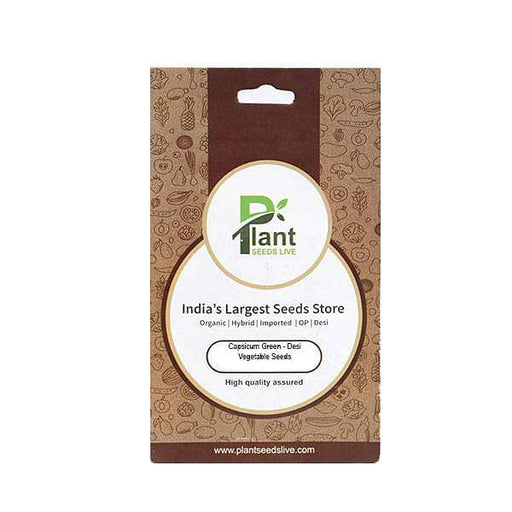
 Save 25%
Save 25%
Capsicum Green - Desi Vegetable Seeds Capsicum Green, also known as bell pepper, is a vibrant and nutritious addition to your garden. Thes...
View full details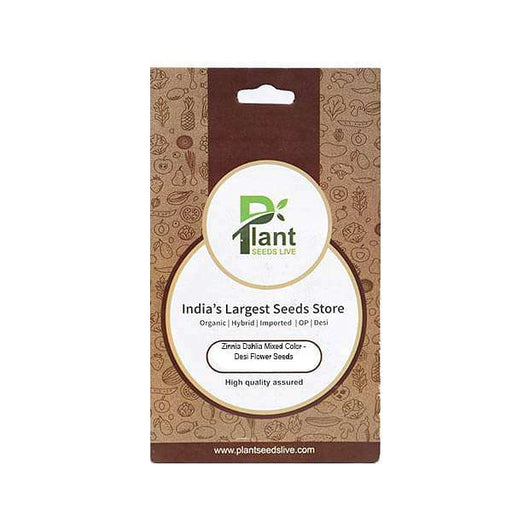
 Sold out
Sold out
Zinnia Dahlia Mixed Color - Desi Flower Seeds Transform your garden into a vibrant tapestry of colors with our Zinnia Dahlia Mixed Color -...
View full details
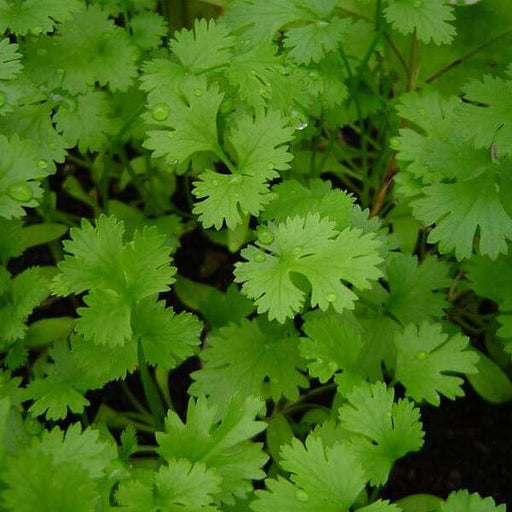 Sold out
Sold out
Coriander Panipat - Desi Vegetable Seeds Coriander Panipat is a premium variety of coriander seeds, cherished for its aromatic leaves and ...
View full details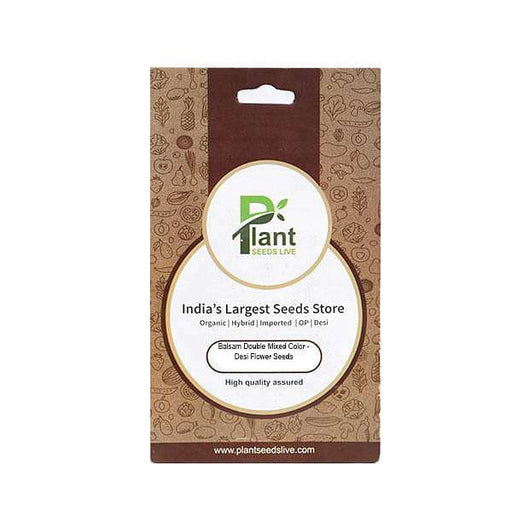
 Save 25%
Save 25%
Balsam Double Mixed Color - Desi Flower Seeds Discover the vibrant beauty of Balsam Double Mixed Color - Desi Flower Seeds, a delightful a...
View full details
 Sold out
Sold out
Tomato Pusa Ruby - Desi Vegetable Seeds The Tomato Pusa Ruby is a premium variety of tomato seeds, renowned for its vibrant red color, jui...
View full details
 Save 25%
Save 25%
Cherry Tomato, Cherry Tomato Honey - Vegetable Seeds Discover the delightful world of Cherry Tomato Honey seeds, perfect for home gardener...
View full details
 Save 25%
Save 25%
Spinach All Green - Desi Vegetable Seeds Introducing the Spinach All Green - Desi Vegetable Seeds, a premium variety of spinach that thriv...
View full details
 Save 25%
Save 25%
Capsicum Green - Desi Vegetable Seeds Capsicum Green, also known as bell pepper, is a vibrant and nutritious addition to your garden. Thes...
View full details
 Sold out
Sold out
Coriander Panipat - Desi Vegetable Seeds Coriander Panipat is a premium variety of coriander seeds, cherished for its aromatic leaves and ...
View full details
 Sold out
Sold out
Tomato Pusa Ruby - Desi Vegetable Seeds The Tomato Pusa Ruby is a premium variety of tomato seeds, renowned for its vibrant red color, jui...
View full details
 Save 25%
Save 25%
Cherry Tomato, Cherry Tomato Honey - Vegetable Seeds Discover the delightful world of Cherry Tomato Honey seeds, perfect for home gardener...
View full details
 Save 25%
Save 25%
Spinach All Green - Desi Vegetable Seeds Introducing the Spinach All Green - Desi Vegetable Seeds, a premium variety of spinach that thriv...
View full details
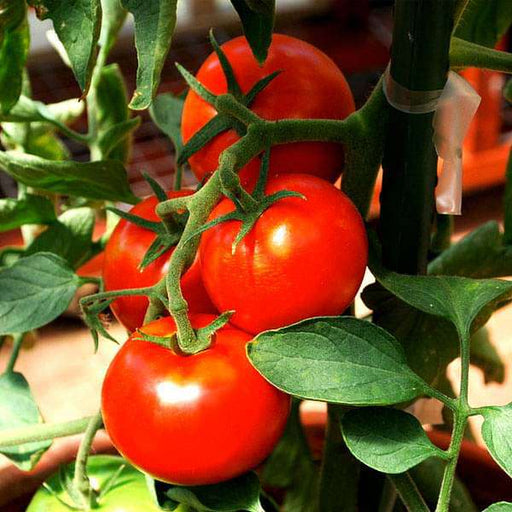 Save 25%
Save 25%
Tomato Ped - Desi Vegetable Seeds Introducing the Tomato Ped - Desi Vegetable Seeds, a premium selection of heirloom tomato seeds that pro...
View full details
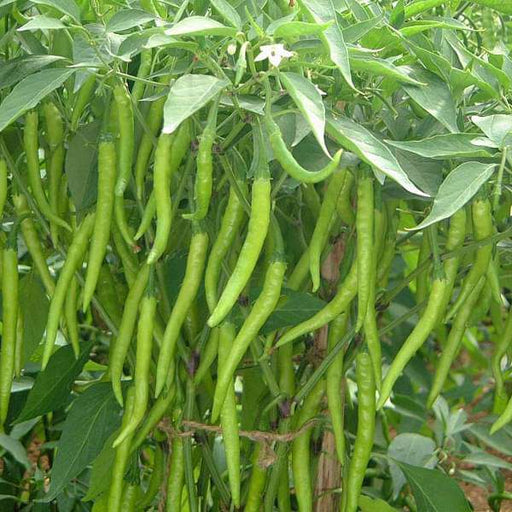 Sold out
Sold out
Chilli Surajmukhi - Desi Vegetable Seeds Introducing the Chilli Surajmukhi, a unique variety of desi vegetable seeds that brings a burst o...
View full details
 Save 25%
Save 25%
Carrot Red Long - Desi Vegetable Seeds Introducing the Carrot Red Long - Desi Vegetable Seeds, a premium variety known for its vibrant col...
View full details
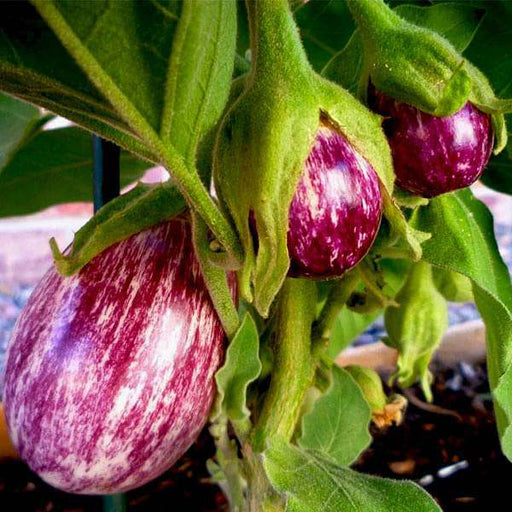 Save 25%
Save 25%
Brinjal Purple Round - Desi Vegetable Seeds Discover the rich flavors and vibrant colors of Brinjal Purple Round, a staple in Indian cuisi...
View full details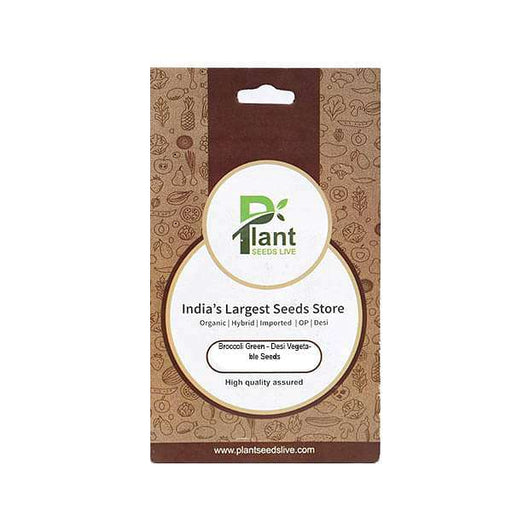
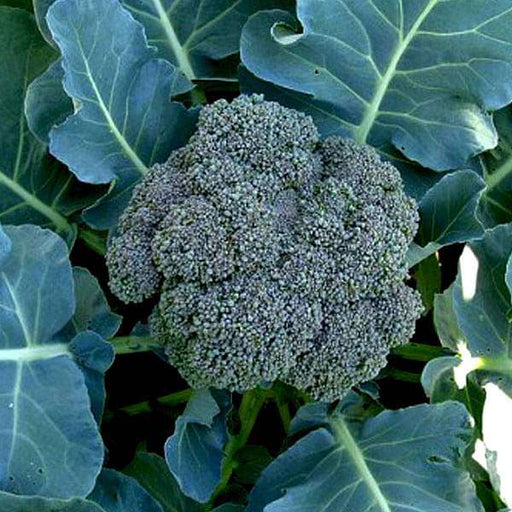 Save 25%
Save 25%
Broccoli Green - Desi Vegetable Seeds Discover the vibrant world of Broccoli Green with our premium Desi Vegetable Seeds. Known for its ri...
View full details
 Save 35%
Save 35%
Best 6 Plants for Perfect Indoor Garden Transform your living space into a lush oasis with our curated collection of the Best 6 Plants for a...
View full details
 Save up to 50%
Save up to 50%
Mini Succulent Garden Pack Transform your space with our Mini Succulent Garden Pack, featuring a delightful collection of 4 any variety beautiful s...
View full details
 Save 30%
Save 30%
5 Best Fragrant Plants Transform your garden or indoor space into a fragrant paradise with our curated selection of the 5 Best Fragrant Plants. Th...
View full details
 Save 24%
Save 24%
Set of 2 Bonsai Looking Grafted Adeniums Transform your indoor or outdoor space with our exquisite Set of 2 Bonsai Looking Grafted Adenium...
View full details Save 45%
Save 45%
Top 4 Die Hard Succulents Pack Transform your indoor or outdoor space with our Top 4 Die Hard Succulents Pack, featuring a curated selecti...
View full details
 Save 30%
Save 30%
5 Best Indoor Plants Pack Transform your living space into a lush oasis with our '5 Best Indoor Plants Pack.' This carefully curated collection fe...
View full details
 Save 25%
Save 25%
Set of 4 Evergreen Air Purifier Plant Pack Transform your indoor space into a lush, green oasis with our Set of 4 Evergreen Air Purifier Pla...
View full details| SrNo | Item Name |
|---|---|
| 1 | Subabul, Leucaena leucocephala - 0.5 kg Seeds |
Discover the remarkable Subabul (Leucaena leucocephala), a fast-growing leguminous tree known for its versatility and environmental benefits. These 0.5 kg seeds are perfect for reforestation, agroforestry, and sustainable land management. With its nitrogen-fixing capabilities, Subabul enhances soil fertility, making it an excellent choice for farmers and gardeners alike.
What sets Subabul apart is its rapid growth rate and adaptability to various soil types and climates. This hardy species can thrive in poor soils, making it a vital resource for land restoration and erosion control. Its leaves are rich in protein, providing excellent fodder for livestock, while its wood is valued for fuel and construction.
Special features of Subabul include its ability to sequester carbon, contributing to climate change mitigation. Additionally, it supports biodiversity by providing habitat for various wildlife species. With its myriad of uses and ecological benefits, Subabul is a must-have for any eco-conscious gardener or farmer.
Subabul plays a crucial role in combating deforestation and soil degradation. Its ability to fix nitrogen enriches the soil, promoting healthier ecosystems. By planting Subabul, you contribute to carbon sequestration, helping to mitigate climate change while supporting local biodiversity.
If you think Subabul is just a pretty face in the tree world, think again! This tree, scientifically known as Leucaena leucocephala, is a multitasking marvel. It’s not just a source of shade; it’s a nitrogen-fixing superstar that enriches the soil, making it a gardener’s best friend. Plus, its leaves are a buffet for livestock, ensuring your farm animals are well-fed and happy. Who knew a tree could be so generous?
When it comes to planting, the 0.5 kg of Subabul seeds is like a treasure chest waiting to be opened. Each seed is a promise of lush greenery and a sustainable future. These little nuggets are packed with potential, ready to sprout into a tree that’s not just good-looking but also eco-friendly. So, grab your gardening gloves and get ready to unleash the magic of nature!
This tree isn’t just a pretty sight; it’s a jack-of-all-trades! From providing fodder for livestock to serving as a natural windbreak, Leucaena leucocephala is the Swiss Army knife of the plant kingdom. Its wood is durable, making it perfect for construction, while its leaves can be used as green manure. Talk about versatility!
Planting Subabul is like hosting a party for nature. Choose a sunny spot, prepare the soil, and give those seeds a cozy home. Water them like you’re nurturing a delicate relationship, and soon enough, you’ll have a thriving tree that’s the envy of the neighborhood. Remember, patience is key; good things come to those who wait!
If you’re looking for a tree that doesn’t believe in taking its sweet time, Subabul is your go-to! This fast-growing wonder can reach impressive heights in just a few years. It’s like the Usain Bolt of the tree world, sprinting towards maturity while you sip your coffee. Just make sure to keep an eye on it; you wouldn’t want it to outgrow your garden!
Subabul is not picky about where it grows; it’s the easy-going friend of the plant world. It thrives in a variety of soil types, from sandy to clayey, as long as there’s good drainage. So, whether you have a patch of dirt or a fancy garden bed, this tree will happily settle in and make itself at home.
If pests were a party, Subabul would be the bouncer. This tree has a natural resistance to many common pests, making it a low-maintenance option for gardeners. It’s like having a bodyguard for your garden, ensuring that your plants stay safe and sound while you kick back and enjoy the view.
Planting Subabul is like giving Mother Nature a high-five. This tree plays a crucial role in combating soil erosion and improving soil fertility. Plus, it’s a carbon sink, helping to absorb CO2 from the atmosphere. So, every time you plant a Subabul, you’re not just beautifying your space; you’re also doing your part for the planet!
Subabul is the life of the agroforestry party! It pairs beautifully with crops, providing shade and improving soil health. Farmers love it because it enhances biodiversity and boosts yields. It’s like having a trusty sidekick that makes every farming adventure more fruitful and fun.
Who knew a tree could double as a pharmacy? Subabul has been used in traditional medicine for its various health benefits. From treating fevers to aiding digestion, this tree is a natural remedy that’s been around for ages. So, next time you’re feeling under the weather, consider consulting your friendly neighborhood Subabul!
Subabul isn’t just a pretty tree; it’s also a money-maker! Its wood is valuable for construction and furniture, while its leaves provide fodder that can boost livestock productivity. By planting Subabul, you’re not just investing in greenery; you’re also planting the seeds of economic opportunity. Who knew being eco-friendly could be so profitable?
Subabul, or Leucaena leucocephala, is a fast-growing tree known for its nitrogen-fixing abilities. It’s like the superhero of the plant world, enriching soil while providing fodder and shade. Perfect for farmers and gardeners looking to boost their green game!
Using 0.5 kg of Subabul seeds is as easy as pie! Just prepare your soil, scatter those seeds, and watch them sprout. They’ll grow into leafy wonders, providing benefits like improved soil health and a cozy habitat for critters.
Planting Subabul is like giving your garden a multivitamin! It improves soil fertility, provides excellent fodder for livestock, and offers shade. Plus, it’s a great carbon sink, helping to combat climate change while you sip your lemonade under its leafy embrace.
Subabul is a bit of a soil chameleon! It thrives in various soil types, from sandy to clayey. However, it prefers well-drained soils. So, if your garden has a personality, Subabul will fit right in, no matter the mood!
Patience is a virtue, my friend! Subabul seeds typically germinate within 7 to 14 days, depending on the conditions. So, while you wait, maybe start planning your victory dance for when those little green sprouts appear!
Absolutely! Subabul can be a pot star. Just ensure your pot is large enough to accommodate its roots and has good drainage. With a little love and care, you’ll have a mini forest right on your balcony!
Subabul loves warm weather, thriving in tropical and subtropical climates. It’s like that friend who only comes out when the sun is shining! If you live in a cooler area, consider giving it a cozy greenhouse to call home.
Watering Subabul is like giving it a refreshing drink after a workout! Initially, keep the soil moist, but once established, it’s quite drought-tolerant. Just remember, too much water can lead to root rot—nobody likes soggy feet!
Subabul can be a bit of a party crasher in some regions, as it may outcompete local flora. It’s essential to check local guidelines before planting. Think of it as inviting a guest who might take over the dance floor!
You bet! Subabul leaves are a nutritious treat for livestock, packed with protein. Just remember to introduce it gradually to their diet, or they might throw a wild party in the barn!
Pests can be pesky, but fear not! Regular monitoring and natural remedies like neem oil can keep them at bay. Think of it as giving your Subabul a spa day—pampering it while keeping those unwanted guests away!
You can find 0.5 kg of Subabul seeds at local nurseries, garden centers, or online retailers. Just make sure to choose a reputable source, so you get the best seeds for your gardening adventure! Happy planting!